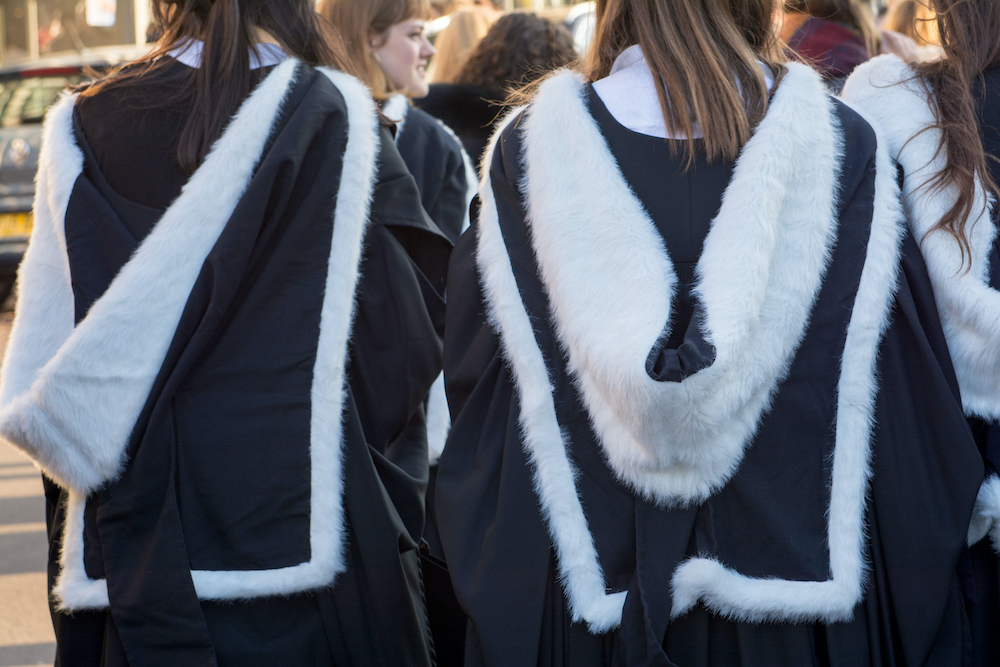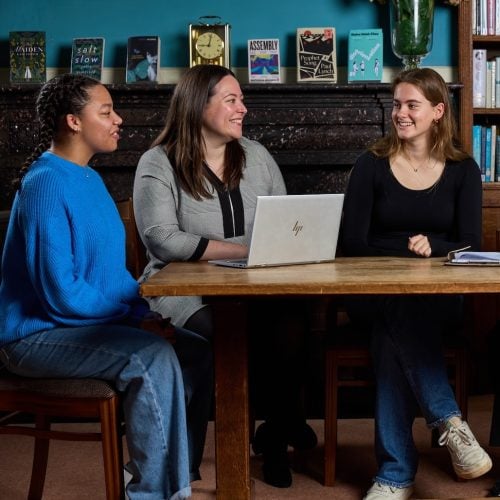How to get into Oxbridge – from the tutors who can triple your chances
The competition is hotter than ever to get into the universities of Oxford and Cambridge, so it’s no surprise that families are turning to the pros to help their kids find an edge. Here’s what you need to know, with a little help from Oxbridge Applications.

The cachet of Oxford and Cambridge seems to grow each year, and so does the difficulty of getting a place. However, there are ways you can help your child increase their odds so we’ve picked the brains of Oxbridge Applications Director Alicia Luba and Head Theo Boyce to give you a head start. Subfusc at the ready? Then we’ll begin.
Oxbridge Applications has been going for 24 years – is it still a case of sherry-sipping dons in wood-panelled studies or have things moved on?
So many things have changed, not least the array of admissions tests, which are added, updated, retired and in some cases, re-introduced over the years. It’s a process that constantly changes at both Oxford and Cambridge and varies by subject – Cambridge, for example, might want two additional pieces of written work for arts and humanities applicants, while other subjects expect one. We have to develop an individual subject pathway for each student.
Another big change has been the level of transparency over applications – there’s more information than ever about admission tests and interviews from the universities themselves – you can even get recorded mock interviews on YouTube. It’s all about improving access, which helps broaden the pool and encourages students to apply from schools without Oxford and Cambridge admissions experts. Application numbers have increased by more than 20% in the last 5 years, so that’s more competition for everyone.
How much do grades matter?
The grade boundaries have gone up in terms of conditional offers – the minimum grade requirement is typically one or two A*s (see the list for Oxford here). However, realistic applicants need to exceed these requirements in their grade predictions, with successful applicants often predicted 3 A*s.
Are there certain subjects to avoid at A-Level and what about three vs four?
Both universities are transparent about not accepting certain subjects like Critical Thinking A level or Dance. We also advise, with exception of one or two degrees, not taking more than one practical or art subject, like, say, both drama and art. But it’s different for every course which is why we sit down with each applicant and work on their individual strategy.
In terms of the three versus four debate, it’s hard to give blanket advice. Taking Latin, Greek, English and History may benefit a classics applicant, but a geographer might just want Geography, Biology and Economics. Its relatively common for STEM applicants to have four A Levels (with two being Maths and Further Maths), but we wouldn’t recommend jeopardising A* predictions through overloading with an extra subject.
And what about at GCSE?
We start the process with many of our applicants when they’re 14, partly to emphasise the importance of GCSE results, though it’s not about the raw grades but where you are in relation to your school’s metric average, because the universities want the highest performers within their contextual environment. A student’s performance at a school with low academic averages, of, say, straight 7s might be equivalent to a student from a high performing school with straight 9s.
As well as needing higher grades will candidates from high achieving schools have a tougher time with the whole application?
Just going to a certain school used to be a stepping stone to Oxbridge but that’s no longer the case. Now if you’re at a good school you need to do even better. There’s a pre-cut before the interview so the universities will compare candidates in relation to their postcodes and other measures of context. Then at interview, if you have two very similar candidates, it’s likely the state school pupil will be chosen over the private school one.
It’s something that some parents have found difficult to deal with. Parents want to see their teenagers go through the same process they went through and there’s a real sense of disappointment from some parents who have chosen to put their children into private education and think that’s enough.
You’ve got the grades, now for the personal statement, right?
Not from 2024. Next year is a big year for UCAS because the personal statement is being scrapped in its current form and so is the reference. This is changing to something similar to US Common App where applicants answer a series of questions. The idea is that it gives students a prompt rather than just a blank page, in order to widen access for those students who may not have such effective support in the applications process.
You’ve got your candidates through to the interview – is that the final hurdle?
The interviews are really about whether a student is suited to the method of teaching. Does the concept of talking and putting forward ideas work for you and are you happy to debate with an academic? Oxbridge is the most verbal and participatory teaching system in the UK and some students just aren’t suited to that way of learning. We really need to rethink the language when people don’t get in as it’s not about being rejected, but that the university feels you’re better suited to another teaching system.
The interview is designed to be challenging. It’s not a verbal test of A level material – it’s about how to think flexibly and apply concepts at above subject level, so with history you might scrutinise a source of a period you have not studied or in English analyse an unfamiliar text. They are testing your talent and move beyond your knowledge quickly to see how you think, adapt, and process.
Can you blag it with confidence?
Interviewers are trained to recognise performativity and assess whether someone has genuine ability in their subject. We’ll give candidates real feedback if they’re coming across at all arrogantly, but that’s rare. Openness, inquisitiveness and listening is what they’re looking for. Equally, being shy doesn’t rule you out of Oxbridge, but if being put on the spot induces stress and nervousness then a student is probably suited to a different learning environment.

Oxbridge interviews are renowned for quirky questions. Is this still the case and what’s the most unusual question you’ve heard of?
Yes. Especially in arts, humanities and social sciences. But interviews are not long so any question they ask has subject relevance. When we think about these strange questions, they’re not going to be asked to throw a brick out of a window or bounce a ball. We had a modern language applicant who was shown a bar code and asked how this interacts with the concept of language, while a PPE applicant might be asked ‘What is a woman?’ or ‘Do animals think?’. Those who try to come up with a definitive answer, which is really common, tend to be on the wrong track. The idea is to explore the question and engage on the same terms as the interviewer. So the animals question – how do we define ‘think’? And are humans included as animals? It’s exactly what you do with an essay question.
Anything NOT to do in an interview?
Try not to give up and say “I don’t know”. You’re not expected to know the answer, but maybe say, “I’ve not encountered this/learnt this, but this sounds like X or I can apply X to this.”
We used to advise people about body language and even what to wear (no high heels!) but we’ve now had two successive years of online interviewing so that’s less relevant, and we are waiting to see if it will revert back to in-person interviews. Some academics want to revert to in-person, especially when it comes to seeing students tackle complex maths and science problems on a white board, for example, but online removes the logistical and geographical barrier for some students and others are in favour of it for this reason. We’ll wait and see.
How – and when – does the process start for kids who are looking to apply for Oxbridge?
I saw a 13-year-old on Sunday in the office which really is too young to do full-time preparation, but it’s a starting point. We’ve also met parents of toddlers who want to know the process and can work backwards from there. At or around 14 though is good because we can advise on subject choice for A level and explain the importance of GCSE results.
What sort of commitment is required from your candidates?
An hour every week or two with a mentor to start, then this will layer up as you get closer. We position ourselves as another extra-curricular activity so there will be an hour each fortnight with prep and work between sessions – the reading is considerable, especially for arts and humanities. Then in the autumn we overlay that with once-a-week admission tests, a residential course in the October half term that’s mandatory, and up to 16 practice interviews if it’s our full support service.
Speaking of extra-curricular, is there still value in the likes of DofE and sport for applicants?
In the Oxbridge process, music, sport, drama and DofE are entirely irrelevant unless central to your subject – only skill sets relating to that listed in each individual subject criteria that will have any bearing on the application.
What is valued by Oxbridge is the ‘super curricular’ so if you’re applying for English, read mediaeval literature or literary theory, compete in nationwide essay competitions or do a relevant EPQ. It’s about being engaged with your subject beyond A level material. It’s important to go off the beaten path and find your own interest beyond the reading lists. However, extra-curricular skills are important in the US, and we’re seeing a huge increase in Dual Track students applying for both Oxbridge and the Ivy League.
So who shouldn’t apply?
If you don’t love academia and don’t want to do a lot of your chosen subject, then it’s not for you. It’s an unequivocally academic environment where it is about sustained academic scholarship. If you can’t cope with frequent exams, essays/work, tutorials and lectures, you’ll find the process gruelling.
So your subject is your passion and you’ve jumped through all the hoops – what are your chances?
The likelihood of being made an offer is very much subject-dependent and the universities are transparent on their subject pages online. For some it is as high as 50% and others it’s as low as 4%.
How does working with you improve their chances?
We tend to triple the success rate of our applicants – so our average is around or above 50%.
That’ll do nicely!
Register online for free here and receive a wealth of resources, including their free e-book “So You Want To Go To Oxbridge? Tell me about a banana”.
Oxbridge Applications consultants are always very happy to discuss your application with you, so feel free to reach out to them on info@oxbridgeapplications.com or +44 (0)20 7499 2394.
You may also like

















